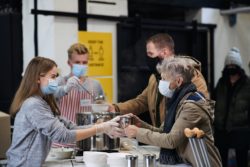Community Outreach, an Ally in Substance Use Recovery

Stopping a bad habit is as simple – and as difficult – as practicing an opposite productive habit.
That may sound wildly oversimplified, and perhaps it is, but think about it for a moment. If you want to break a habit of negativity, you practice gratitude; to break overindulgence, you practice self-control; to stop selfishness, you practice selflessness.
You might be thinking, “That’s easier said than done,” and you wouldn’t be wrong – in fact, you’d be quite right. It is easier said than done to grow in gratitude, positivity, self-control and selflessness. Saying you’re going to do something is simple. It’s following through on those words that’s the hard part. But a life of virtue, freedom and peace is hardly won through ease.
To get to that point, however, you have to dedicate yourself to practicing methods of life which reflect the end goal, not the initial starting point. You have to commit to making changes in your current life, breaking bad habits and putting good ones in their place.
The concept of addiction
If you think about it, an addictive behavior is a self-focused behavior. Someone motivated by addiction is constantly focused on when they can get their next fix. Their life can become controlled by how and where they will acquire the substance, and when they’ll need to take more. Friends, family, school, careers and any shred of normal life have the potential to be cast to the side, abandoned in the search for fulfillment from substances. Ultimately, this process does not fulfill anyone in the way they want or need, so the habit grows and grows until it’s all but unmanageable. Often at this point, intense rehab is needed to help individuals restore a sense of balance.
Once someone is through the hardest parts of recovery, however, they find themself needing to avoid an overabundance of free time. Relapse is a reality that many seek to prevent through engaging in other busy, yet healthy and productive, behaviors.
The opposite of addiction
If addiction is a self-focused behavior and avoiding relapse means engaging in productive behavior opposite of addiction, one of the most obvious options is volunteer work or community service.
Community outreach is focused on the other. Volunteering is defined by the offering of your time in service of another. It’s the kind of work that turns into a labor of love, when you’re so mentally invested in the good work you’re doing for another person that you forget you’re not working for yourself.
But is this true? Isn’t there a piece of volunteer work that is massively fulfilling, even if there’s “nothing in it for you”? We, along with many volunteers, believe it to be so.
Benefits of community service
Community service gives you the opportunity to give back to the public, whether you’re offering up your time to keep the local neighborhood clean, maintaining the area’s national park or preparing food for others at a soup kitchen.
Community outreach can also help keep your recovery center-stage. When you’re volunteering, whether at a zoo, an animal shelter or the local library, you’re using your time to build healthy habits. You’re focused on filling your free time with productive activities, instead of finding opportunities to engage in substance use.
Community outreach also keeps you involved in society in a wholesome environment. You build relationships with your fellow volunteers, contribute as an active member of the community service team and help the people who are counting on you. Instead of becoming lonely and isolated in drug use, you remain surrounded by others in service. A sense of freedom comes in knowing you’re choosing to give your time up for the benefit of others.
Volunteering allows you to help someone in need and to be relied on by those people. Even if you’re volunteering at an animal shelter, both the people and the animals are counting on you to show up and walk the dogs or feed the cats. Knowing you are needed, knowing someone is counting on you, on your hard work and your contribution, knowing you are making a difference in people’s lives, gives an intense sense of inner healing.
Community service in recovery
Recovery is a long journey, but it’s not impossible. Boiled down to the simplest terms, maintaining recovery is a matter of pursuing habits opposite to those pursued when utilizing substances. To combat the isolation, loneliness and selfishness, contributing to the community through volunteer work reigns high above other routes as one of the best medicines. And if you ever need more support or someone to talk with during recovery, no matter which stage of the recovery you find yourself, Pyramid Walden offers help through expert counseling and recovery services. Reach out to Pyramid Healthcare, or call (301) 997-1300 today, to get started.







